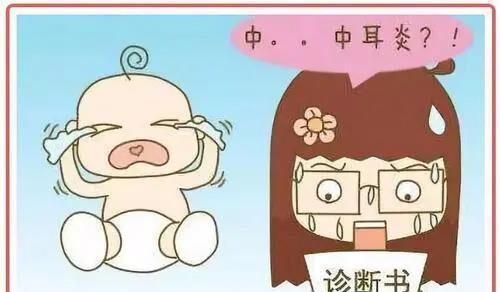Children have poor resistance, and colds are not a rare thing for children. The common cold heals quickly after taking medicine or getting an injection. Therefore, parents are not particularly worried about their children's colds.
But when the child has a cold and plucks his ears, is easy to be irritable, or complains that his ears are itchy and painful, he should be vigilant! Your child may have otitis media from a cold!

Why do children have a cold that easily causes otitis media?
The incidence of otitis media in children is much higher than in adults, and the Eustachian tube in children is shorter, wider, flatter, and lower than that of adults. When a child has a respiratory infection, the pathogenic bacteria can easily enter the middle ear through the Eustachian tube, causing otitis media.
In addition, children have poor resistance, insufficiency of the middle ear, poor defense against germs, and are more likely to suffer from otitis media than adults.
What other causes can easily lead to otitis media in children?
1. Improper feeding of infants: if the infant lies flat to drink water and drink milk, if the amount is too large and urgent, water or milk can enter the middle ear through the Eustachian tube, which is in danger of causing otitis media.
2. Spread of the outer ear: digging the ear with unclean utensils, digging the ear to damage the mucous membrane or tympanic membrane, and swimming or diving in unclean water can cause pathogenic bacteria to enter the middle ear and cause otitis media.
3. Treatment interruption: Usually acute otitis media will soon be alleviated or even disappeared by taking medicines or injections and other treatment measures, it is recommended to go to the hospital for a follow-up consultation, do not stop taking medicines and treatment according to their own judgment. Acute otitis media can easily lead to purulent otitis media if not treated in a timely or thorough manner.
Children are in the period of physical growth and development, and otitis media is very harmful to children. Not only does it cause hearing loss, but it also affects language skills and causes various complications.
What are the dangers of otitis media:
1. Cause hearing loss and cause language learning disorders: if otitis media is repeated or not treated in time, it may lead to secondary diseases such as tympanic sclerosis, adhesion otitis media, and cholesteric granulomas.
If permanent hearing loss is caused, treatment is very difficult. If infants and young children have language learning disabilities due to hearing difficulties, it will seriously affect the child's mental development. Repeated otitis media can cause perforation of the tympanic membrane to enlarge and adhesions to the middle ear to harden, further decreasing hearing. If not properly used, it can also cause a decrease in the function of the inner ear nerves, making it more difficult to treat.
2. Cause a variety of serious complications: repeated inflammation of the middle ear can lead to osteophysic or cholesteatoma type otitis media, and bone erosion may lead to facial nerve palsy, meningitis, brain abscess and other intracranial and extracranial complications, and even life-threatening.
3. If the treatment of acute otitis media is not timely, it will lead to chronic otitis media.
If younger children have otitis media, it is generally not easy for parents to detect abnormalities in their children quickly. Therefore, parents should understand the manifestations of children suffering from otitis media.
Manifestations of otitis media in children
1. Systemic symptoms: it can cause children with fever, nausea and vomiting and other systemic symptoms;
2. Local symptoms: it will cause children's earache, ear pus, running water, hearing loss and other symptoms.
When the child has symptoms of otitis media, parents must pay attention to it and go to the professional and regular hospital otolaryngology department for examination and treatment in time to prevent the child's condition from worsening and causing serious consequences such as perforation of the eardrum.